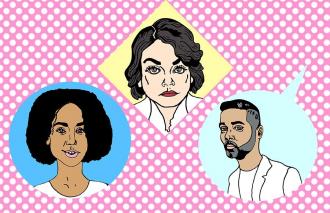The Bay Area Book Festival is well known for bringing world-renowned writers to Downtown Berkeley every spring, but one of this year’s most promising panels doesn’t feature a novelist, poet or essayist, but rather, three comic book creators. On May 4, Juliana “Jewels” Smith, Nora Krug and Edgardo Miranda-Rodriguez will speak at a panel called “Comic Consciousness: Graphic Novelists Tackle Cultural Identity and Crisis.”
In interviews with The Daily Californian, Smith, Miranda-Rodriguez and Krug spoke to the potential for their work to become tools for social change, or at the very least, opportunities for comic book readers to become better versed in radical Black feminism, Puerto Rican disaster relief efforts and German national guilt, respectively.
“I love where I think comics are headed. And beyond simply representation, I see a lot of folks sharing their stories, and I think that’s powerful, and I’m totally here for that,” Smith said.
Smith’s “(H)afrocentric” — which you can read either in a four-volume collection or as a separate online comic strip — follows Naima Pepper, the titular biracial activist and an undergraduate student at the fictional Ronald Reagan University who somehow always has access to a literal manifestation of a soapbox. As an exploration of Black collegiate life, nearly every panel of “(H)afrocentric” bursts with social satire and searing non sequiturs — anything from references to Angela Davis and James Baldwin to shade at Mark Wahlberg.
For Smith, the comic’s in-jokes are meant to be a call to action: “A lot of what I try to do in the book and in the comic strip is just drop little gems in the hope that if somebody doesn’t know who Assata Shakur is, they’ll go … pick up her autobiography,” Smith said.
“(H)afrocentric” uncannily taps into the realities of campus life, which often exists in the public imagination as a hyperbolic space of inclusivity and political correctness. But as UC Berkeley students know too well, that often isn’t the case, with the fictional Ronald Reagan University finding an analogue in our own Barrows Hall, a building named after a white supremacist. More recently, UCPD’s arrest of two Black students demonstrated the extent to which anti-Blackness exists on campus.
The sense of pressing immediacy that’s present in “(H)afrocentric” is something that’s shared by “Ricanstruction: Reminiscing & Rebuilding Puerto Rico,” a comic book anthology produced by Miranda-Rodriguez in the aftermath of Hurricane Maria. With his wife Kyung Jeon-Miranda, Miranda-Rodriguez operates the design firm Somos Arte, which publishes his comic book “La Borinqueña,” a superhero title featuring Puerto Rico’s own high-flying caped crusader.
Miranda-Rodriguez teamed up with DC Comics and a host of Puerto Rican and Latinx creators for a crossover between “La Borinqueña” and classic superheroes such as Wonder Woman and Batman. The result — “Ricanstruction,” a book whose proceeds directly assist Puerto Rican relief efforts. With Puerto Rico facing massive debt in addition to the Trump administration’s repeated attempts to withhold disaster relief funding and resources, “Ricanstruction” proves to be a necessary read in light of one of the worst natural disasters to hit U.S. soil.
“This was not going to be a book that was going to be solely about stories of escapism and fantasy, but it was going to remind you of the harsh reality that (Puerto Rican) people live through and survive — through those that did survive,” Miranda-Rodriguez said. Notably, several stories in “Ricanstruction” omit appearances by La Borinqueña and other superheroes, foregrounding instead the stories of everyday Puerto Ricans.
The communication of personal history through the comic book medium is something that “Ricanstruction” shares with Krug’s “Belonging,” which combines traditional sequential storytelling with a collage-like layout to create a vibrant graphic memoir.
Through “Belonging,” Krug examines her family’s involvement with the Nazi party during World War II. Her personal history might signal a more nuanced national recognition of guilt for the German people.
“(Belonging) was never meant to be an attempt of redeeming anything or asking for forgiveness, but just an attempt of understanding better how the memory of war works and how we deal with the memory of war,” Krug said.
Troublingly, “Belonging” isn’t only a retrospective examination on the role of individuals in the rise of fascism, and the book’s message isn’t even limited to German history. Krug remarked on the book’s significance in light of the rise of far-right nationalist movements across the globe.
“We carry the past in us. We are only who we are because of what was before. Our societies are the way they are because of what was before, and we need to also understand that democracy is a process and not a given,” Krug elaborated.
Ultimately, with comic book culture having entered the mainstream, it is worth remembering that comic books have always been rooted in sociopolitical consciousness. Miranda-Rodriguez said he wanted to write “La Borinqueña” in order to bring superhero stories back to their politically charged roots, citing the cover of “Captain America” No. 1, in which Cap throws Adolf Hitler a mean right hook.
While all three comics are distinct and tackle seemingly disparate social and political issues, readers can look forward to the creators having an enriching conversation on how stories of activism and identity may overlap. In this sense, the future of the comic book medium is looking nothing but bright.
Tickets for “Comic Consciousness: Graphic Novelists Tackle Cultural Identity and Crisis” and for the Bay Area Book Festival are on sale now until May 4.
Harrison Tunggal covers comic books. Contact him at htunggal@dailycal.org.
